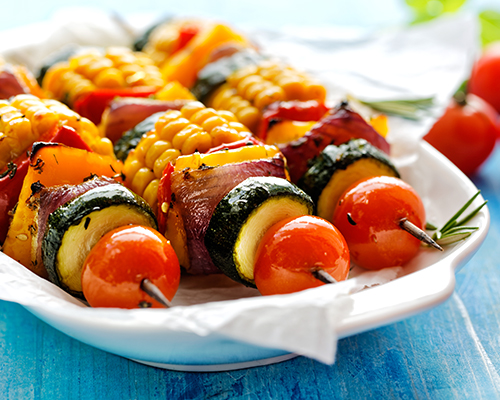
Summer is here—that wonderful time of year when fresh, delicious produce is everywhere! While it’s a great idea to follow a well-balanced diet all year long, many foods widely available right now can be especially helpful in preventing gout flares.1 Read on to learn more and to find out which foods to try as you explore eating healthy with gout.
What is gout?
Gout is a painful type of inflammatory arthritis caused by the build-up of urate crystals in the joints.2,3 These urate crystals form when there is too much uric acid in the bloodstream.3
What is the connection between diet and gout?
Uric acid is produced when the body breaks down chemicals called purines.3 Purines occur naturally in your body.3 They are also found in certain foods and drinks including organ meats, some seafood and beer.3
In most people, purines are converted to uric acid by the body and eliminated in the urine.3 In adults with gout, however, uric acid is not easily eliminated and can build up in the bloodstream.3 When uric acid builds up, urate crystals can form in the joints and trigger a gout flare.3
Seasonal staples
Raise your glass (and your fork!) and celebrate summer with the best foods and drinks the season has to offer.
Cherries
Over the past several years, cherries have caught the attention of scientists, doctors and patients for the potentially positive role they can play in a gout-friendly diet. A 2012 study of 633 people with gout showed that those who ate cherries and/or cherry extract over a 2-day period had a 35 percent lower risk of gout flares.4 Another small study showed that Montmorency tart cherry consumption reduces uric acid levels and inflammation.5
Vegetables
Good news: Your local farmer’s market or grocery produce aisle has lots of fresh vegetables for you to stock up on and enjoy this season. Even better news: While it was once believed that asparagus, mushrooms and spinach might contain high levels of purines, recent research shows no connection between these vegetables and gout flares.6 Scientists now believe that the beneficial compounds in these foods may offset the effects of the purine content.6
Dairy
Low-fat dairy products such as milk and yogurt may increase the amount of uric acid the body eliminates in the urine.6 This benefit may be due to the high protein and low purine content of these foods.6
Coffee
Whether hot or iced, many of us can’t imagine starting our day without coffee. But if you need another reason to drink up, here it is: a research study showed that people who drink four or more cups of regular or decaf coffee each day had lower uric acid levels than those who did not.7 In fact, the more coffee the study participants drank, the lower their uric acid levels were.7 But drinking more coffee may not be the best thing for everyone—be sure to ask your doctor how much coffee is okay for you.1
Water
Drinking more water may mean fewer gout flares.6 A study from 2009 showed that with each glass of water consumed in the 24 hours before an attack, the risk for recurrent gout attacks decreased.6 The study could not make a specific recommendation about how much water is most beneficial, however.6 Talk with your doctor about the right amount of water for you to drink each day.6
Steer clear of alcohol
While cold beer and wine may tempt you at parties and backyard barbeques, remember that alcohol may raise your risk of a gout flare.8 This is especially true if you have more than one drink a day.8 Beer appears to be more risky than other alcoholic drinks due to its higher-than-average purine content.8
Support gout flare prevention with your diet this summer
Refer to the chart below to make food and drink choices that can help you avoid gout flares and enjoy summer to the fullest.
Gout Diet Tips: An Overview9*
| AVOID |
|
| TRY TO LIMIT |
|
| CHOOSE INSTEAD |
|
*Adapted from the 2012 American College of Rheumatology Guidelines for Management of Gout. Part 1: Systematic Nonpharmacologic and Pharmacologic Therapeutic Approaches to Hyperuricemia.
NOTE: This article was not written by a medical professional and is not intended to substitute for the guidance of a physician. These are not West-Ward’s recommendations for gout flare prevention, but rather facts and data collected from various reliable medical sources. For a full list of resources and their attributing links, see below.
